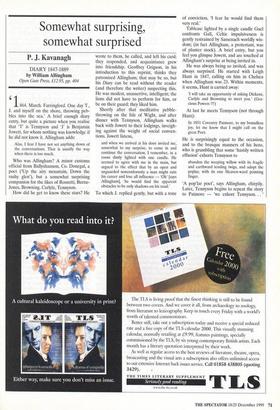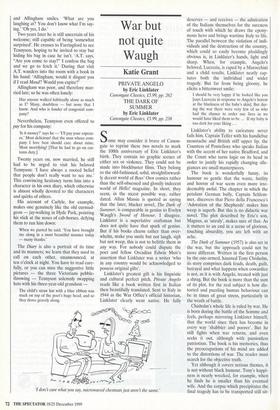Somewhat surprising, somewhat surprised
P. J. Kavanagh
DIARY 1847-1889 by William Allingham Open Gate Press, 112.95, pp. 404
41 864. March. Farringford. One day T., J. and myself on the shore, throwing peb- bles into the sea.' A brief enough diary entry, but quite a picture when you realise that T is Tennyson and T is Benjamin Jowett, for whom nothing was knowledge if he did not know it. Allingham adds:
Alas, I fear I have not set anything down of the conversations. That is usually the way when there is too much.
Who was Allingham? A minor customs official from Ballyshannon, Co. Donegal, a poet ('Up the airy mountain, Down the rushy glen'), but a somewhat surprising companion for the likes of Rossetti, Bunte- Jones, Browning, Carlyle, Tennyson.
How did he get to know these stars? He
wrote to them, he called, and left his card; they responded, and acquaintance grew into friendship. Geoffrey Grigson, in his introduction to this reprint, thinks they patronised Allingham; that may be so, but his Diary can be read without the reader (and therefore the writer) suspecting this. He was modest, unassertive, intelligent; the lions did not have to perform for him, or be on their guard; they liked him.
Shortly after that meditative pebble- throwing on the Isle of Wight, and after dinner with Tennyson, Allingham walks back with Jowett to their lodgings, inveigh- ing against the weight of social conven- tions. Jowett listens,
and when we arrived at his door invited me, somewhat to my surprise, to come in and continue the conversation, I remember, in a room dimly lighted with one candle. He seemed to agree with me in the main, but argued to the effect that by an open and unguarded nonconformity a man might ruin his career and lose all influence — 'Oh' [says Allingham], 'he would find the apparent obstacles to be only shadows on his road.'
To which J. replied gently, but with a tone of conviction, 'I fear he would find them very real.'
Tableau: lighted by a single candle Gael confronts Gall, Celtic impulsiveness is gently restrained by Sassenach worldly wis- dom; (in fact Allingham, a protestant, was of planter stock). A brief entry, but you feel you glimpse Jowett, and are touched at Allingham's surprise at being invited in.
He was always being so invited, and was always surprised. He started with Leigh Hunt in 1847, calling on him in Chelsea when Allingham was 23. Within moments, it seems, Hunt is carried away:
'I will take an opportunity of asking Dickens, Carlyle and Browning to meet you.' (Gra- cious Powers !!!)
At last he meets Tennyson (not through Hunt): In 1851 Coventry Patmore, to my boundless joy, let me know that I might call on the great Poet.
He is surprisingly equal to the occasion, and to the brusque manners of his hero, who is grumbling that some 'hastily written effusion' exhorts Tennyson to
abandon the weeping willow with its fragile and earthward tending twigs, and adopt the poplar, with its one Heaven-ward pointing finger.
'A poplar poet', says Allingham, chirpily. Later, Tennyson begins to repeat the story to Patmore — 'we exhort Tennyson... ' and Allingham smiles. 'What are you laughing at? You don't know what I'm say- ing.' Oh yes, I do.'
Two years later he is still uncertain of his welcome; still capable of being 'somewhat surprised'. He crosses to Farringford to see Tennyson, hoping to be invited to stay but hiding his bag in case he isn't. 'A.T. says, "Are you come to stay?" I confess the bag and we go to fetch it.' During that visit A.T. wanders into the room with a book in his hand: 'Allingham, would it disgust you if I read Maud? Would you expire?'
Allingham was poor, and therefore mar- ried late; so he was often lonely:
Has anyone walked habitually alone as much as I? Many, doubtless — but none that I know. And who is fonder of congenial com- pany?
Nevertheless, Tennyson even offered to pay for his company:
Is it money?' says he — 'I'll pay your expens- es.' Most delicious! that the man whose com- pany I love best should care about mine. Most mortifying! [That he had to go on cus- toms duty.]
Twenty years on, now married, he still had to be urged to visit his beloved Tennyson: 'I have always a rooted belief that people don't really want to see me.' This convincing hesitancy turns him into a character in his own diary, which otherwise is almost wholly devoted to the characters and quirks of others.
His account of Carlyle, for example, makes one genuinely like the old curmud- geon — jay-walking in Hyde Park, pointing his stick at the noses of cab-horses, defying them to run him down:
When we parted he said, 'You have brought me along in a most beautiful manner today — many thanks.'
The Dialy is also a portrait of its time and its manners; we learn that they used to call on each other, unannounced, at ten o'clock at night. You have to read care- fully, or you can miss the suggestive little pictures — the three Victorians pebble- throwing — Tennyson solemnly swapping hats with his three-year-old grandson —
The child's straw hat with a blue ribbon was stuck on top of the poet's huge head, and so they drove gravely along.























































































































 Previous page
Previous page